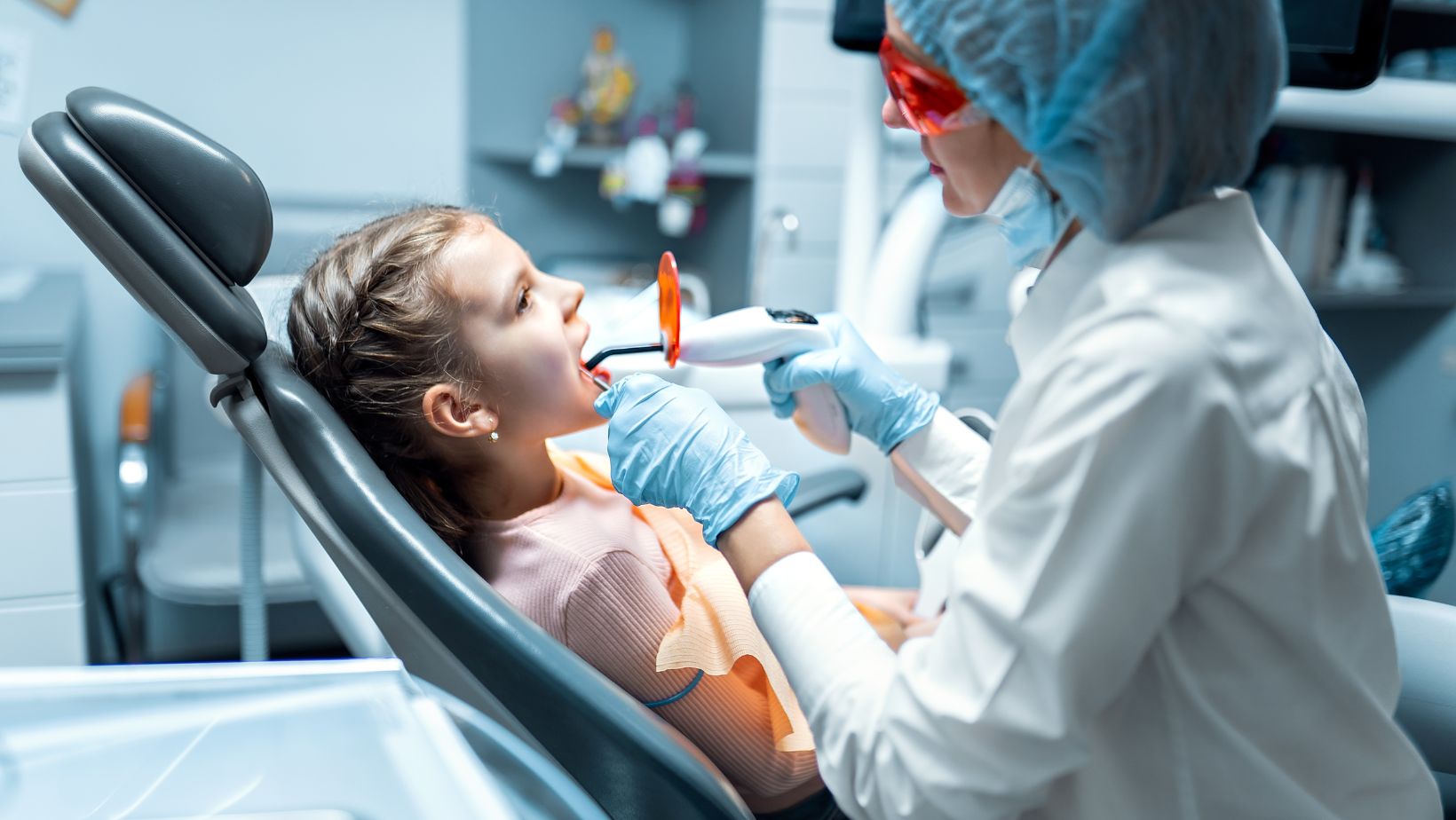Pediatric Dentistry in West Orange, NJ: What Parents Need to Know
As you navigate the intricacies of parenthood, one aspect that may require your attention is pediatric dentistry. More specifically, understanding its relevance in West Orange, NJ, can prove to be immensely beneficial for your child’s overall health. Pediatric dentistry plays a pivotal role in a child’s oral health from infancy through adolescence. But what should parents in West Orange, NJ know about this specialized branch of dentistry? What are the potential benefits, common procedures, and how can it help alleviate dental anxiety in children? Let’s explore this further.
Understanding Pediatric Dentistry
Pediatric dentistry, a specialized branch of oral healthcare, is dedicated to managing the dental needs of children from infancy to adolescence, ensuring their ultimate oral health throughout their formative years. This field of dentistry is uniquely tailored to provide thorough preventive and therapeutic dental care to our younger population.
One paramount aspect of pediatric dentistry is dental phobia management. A significant number of children experience fear or anxiety in dental settings, which can hinder their cooperation and compromise the quality of their dental care. Pediatric dentists are trained to handle these phobias gently, using techniques to alleviate fear and promote a positive dental experience.
Another critical topic in pediatric dentistry is understanding the impact of thumb sucking. This common habit among infants and young children can lead to various dental problems if prolonged, such as improper tooth alignment and growth of the jaw. Pediatric dentists are equipped with the knowledge and skills to address these issues, providing guidance and interventions to curb the habit and mitigate its effects.
Importance of Early Dental Visits
The significance of early dental visits cannot be overstated for the pediatric population in West Orange, NJ. These initial appointments not only help familiarize the child with the dental environment, but also serve as a proactive measure to prevent issues such as childhood tooth decay. Hence, understanding the benefits of early check-ups can play a pivotal role in setting a strong foundation for your child’s oral health.
Benefits of Early Check-ups
Ensuring a child’s early exposure to dental check-ups can yield long-term benefits, setting a strong foundation for their oral health. Regular visits allow dentists to monitor oral development, detect potential problems and implement corrective measures promptly. The recommended check-up frequency is twice a year, although this may vary depending on individual circumstances. Dental insurance for children often covers preventative care, such as cleanings and examinations, making these visits financially manageable. Early check-ups also help to familiarize children with the dental environment, reducing anxiety and fostering a positive attitude towards oral health. Making early dental visits a priority is a worthwhile investment in your child’s future health and well-being.
Preventing Childhood Tooth Decay
Building upon the significance of early dental visits, preventing childhood tooth decay is another important aspect that parents should be aware of. It is critical to understand the role of tooth fairy traditions, not just as a fun childhood experience, but as an opportunity to educate kids about the importance of oral hygiene. It is important to instill in children that losing a tooth is natural but also the result of not taking care of their teeth. On the other hand, the effects of sugary drinks cannot be underestimated. Despite their appealing taste, regular consumption can lead to tooth decay. As part of preventative care, parents should limit their child’s intake of such beverages, ensuring a healthier smile for their little ones.
Preparing for Your Child’s First Visit
Initiating your child’s first experience with pediatric dentistry in West Orange, NJ, can be an important moment, setting the groundwork for their lifelong oral health habits. Preparation is key to ensuring a positive experience, especially considering the potential for a child’s dental fears.
Educate your child about what to expect during their visit, using simple, non-threatening language. Picture books or children’s videos about dental visits can be helpful. Reassure them that the dentist is a friend, there to help keep their teeth strong and healthy.
Building trust with the dentist is another essential aspect. Schedule a meet-and-greet before the actual appointment, giving your child a chance to become familiar with the dentist and the environment. The dentist can explain their tools and procedures in a friendly, engaging way, further alleviating fears.
During the visit, remain calm and positive, as children often mirror their parents’ emotions. You may also want to bring a comfort item, like a favorite toy, to provide additional reassurance.
Common Pediatric Dental Procedures
In the domain of pediatric dentistry, there are several common procedures that your child may undergo to maintain and improve their oral health. Regular cleanings and fluoride treatments serve to protect your child’s teeth from decay. Dental sealants may be applied to the chewing surfaces of back teeth to prevent cavities.
Tooth eruption is another key element of pediatric dental care. This process, which involves the emergence of a child’s teeth through their gums, is closely monitored and managed by pediatric dentists. If any issues arise, such as delayed eruption or impaction, timely intervention can prevent further complications.
In some instances, more intensive procedures may be necessary. These can include tooth extractions, root canal treatments, or orthodontic interventions. Rest assured, when you connect with a dentist in West Orange, NJ for your child’s care, they are skilled in managing children’s anxiety and discomfort. Various sedation options are available, from nitrous oxide (laughing gas) to general anesthesia, ensuring your child’s utmost comfort during any procedure.
Understanding these common pediatric dental procedures can help parents feel more prepared and confident about their child’s dental health. Remember, regular dental visits and proactive care are crucial to your child’s long-term oral health.
Recognizing Dental Anxiety in Children
Understanding and managing dental anxiety can greatly enhance a child’s experience during their dental visits, given that this common phenomenon can manifest in various ways among young patients. Parents must be vigilant in recognizing the signs of dental anxiety in their children to initiate appropriate child’s fear management and anxiety coping techniques.
- Reluctance or refusal to go to the dentist: This might be an initial sign of dental anxiety in children. They may express their resistance verbally, or show uncooperative behavior as the appointment approaches.
- Physical symptoms: Anxiety can manifest in physical ways. Children might complain about stomachaches, headaches, or feel nauseous before a dental visit.
- Emotional distress: Your child may display heightened emotions such as crying, tantrums, or excessive clinginess particularly when the topic of dental visits is broached.
- Sleep disturbances: Anxiety can often disrupt sleep. Notice if your child has trouble sleeping, experiences nightmares, or exhibits other sleep-related issues prior to dental appointments.
Recognizing these signs early and employing proper anxiety coping techniques can mitigate the negative impacts of dental anxiety, fostering a more positive relationship between your child and their oral health care.
How to Maintain Your Child’s Oral Health
Maintaining your child’s oral health is an important aspect of their overall wellbeing. This includes establishing a thorough dental hygiene routine and taking preventive measures to avoid common pediatric dental issues. In the following, we will provide guidance on both these critical areas to help you make sure your child’s dental health is always at its best.
Child’s Dental Hygiene Routine
Ensuring your child’s oral health involves a consistent, thorough dental hygiene routine, designed to prevent tooth decay and gum disease. The correct toothbrush selection is crucial, choose a soft-bristled brush suitable for your child’s age group. Next, teaching effective flossing techniques early on will pay dividends for your child’s future oral health.
Here are four essential components to a successful dental hygiene routine:
- Regular brushing: Encourage brushing at least twice a day, after breakfast and before bed.
- Flossing: Introduce flossing as soon as two teeth touch each other.
- Balanced diet: Limit sugary treats and promote a diet rich in fruits, vegetables, and dairy.
- Regular dentist visits: Schedule check-ups every six months to keep track of your child’s oral health.
Preventing Pediatric Dental Issues
In the domain of pediatric dentistry, proactive measures are instrumental in warding off potential dental issues and fostering lasting oral health for your child.

Oral Health Education plays a critical role in this endeavor. It is essential to teach children about the importance of proper brushing, flossing, and regular dental check-ups. This knowledge can empower them to take ownership of their oral health from a young age.
In addition to education, the use of Innovative Dental Tools can greatly enhance the effectiveness of your child’s oral care routine. Today’s dental technology offers various tools designed specifically for children, making dental care more efficient and enjoyable. By combining education with the right tools, you can help ensure a bright dental future for your child.
Dealing With Dental Emergencies
When faced with a dental emergency involving your child, knowing the appropriate steps to take can be crucial for mitigating pain and preventing further damage. One should always have emergency kit essentials at hand, including gauze, a small container with a lid, and a cold compress.
Here are the steps to follow in a dental emergency:
- Assess the situation: Understand the severity of the injury. If there’s excessive bleeding or extreme pain, seek immediate professional help.
- Initial care: Rinse the mouth with warm water and apply a cold compress if there’s swelling. Use gauze to stop any bleeding.
- Recover any lost teeth or fragments: If a tooth gets knocked out, handle it by the crown, not the root, and try to reinsert it in the socket. If that’s not possible, place it in a container with milk or a tooth preservation product.
- Reach out to a professional: Contact your pediatric dentist immediately. Most dental practices in West Orange, NJ, including ours, offer after-hour services to manage such emergencies.
Healthy Eating for Dental Health
Just as important as regular dental check-ups, a balanced diet plays an instrumental role in maintaining your child’s oral health. Nutrition’s impact on teeth is profound, and understanding this can help parents make better meal choices for their children.
Dietary habits established in childhood often carry into adulthood, making it vital to instill the importance of healthy eating from an early age. A diet rich in fruits, vegetables, proteins, and dairy products provides essential nutrients that promote strong, healthy teeth and gums. Conversely, frequent consumption of foods high in sugars and starches can lead to tooth decay.
Sugar consumption effects are particularly detrimental when it comes to dental health. Sugars in food and drinks react with the bacteria in plaque, producing acids that weaken tooth enamel. Over time, this can result in cavities and other oral health problems.
To mitigate sugar’s harmful effects, try to limit your child’s intake of sugary snacks and drinks, replacing them with healthier alternatives. Regular brushing and flossing, combined with a balanced diet, can go a long way in preserving your child’s oral health. Remember, the foundation for a lifetime of strong, healthy teeth begins with good dietary habits.
Pediatric Dentistry Vs General Dentistry
As we shift our focus, it’s important to distinguish between pediatric dentistry and general dentistry, as each holds a unique role in maintaining oral health. Pediatric dentistry, as the name suggests, is tailored specifically for children and their developing teeth. On the other hand, general dentistry encompasses a broad range of dental care for individuals of all ages, providing a thorough approach to oral health.
Understanding Pediatric Dentistry
In the intricate world of dentistry, understanding the distinct roles of pediatric dentistry versus general dentistry can provide important insights for parents seeking the best oral care for their children. Pediatric dentistry specifically caters to the oral health needs of children from infancy through adolescence.
- Pediatric dentists are trained to handle teething troubles, a common issue for babies as their first teeth begin to emerge.
- They guide parents and children through the various dental development stages, ensuring proper growth and alignment.
- Pediatric dentists are also experts in preventive care, aiming to ward off cavities and other potential dental issues.
- Additionally, they create a friendly, comforting environment to alleviate children’s fears about dental visits, fostering a positive attitude towards oral health.
General Dentistry Explained
While pediatric dentistry specifically addresses the oral health needs of children, general dentistry has a broader scope, encompassing oral health care for individuals of all ages. It includes routine cleanings, fillings, crowns, and more complex procedures like root canals. General dentists also play a key role in diagnosing and treating dental phobias, ensuring that patients feel comfortable and relaxed during their visits. They offer sedation options for those who are particularly anxious or undergoing more extensive treatments.

Both pediatric and general dentists aim to promote good oral hygiene practices and maintain the overall dental health of their patients. Understanding the differences can help parents make informed decisions about their child’s dental care.
The Role of Fluoride in Children’s Dentistry
How important is fluoride in maintaining your child’s dental health? The answer is, extremely. Fluoride plays a crucial role in pediatric dentistry due to its proven benefits in preventing tooth decay and promoting strong, healthy teeth.
Regarding fluoride safety, it is vital to monitor the fluoride levels your child is exposed to. This can be done by ensuring they use the correct amount of fluoride toothpaste and limiting their consumption of fluoridated water and other fluoride sources.
Here are four key facts about fluoride that every parent should know:
- Fluoride strengthens tooth enamel, making it more resistant to decay.
- It can reverse early tooth decay.
- Fluoride is available in various forms: toothpaste, mouth rinses, professionally applied gels or varnishes, and in water or food.
- Excessive fluoride can lead to dental fluorosis, a cosmetic issue affecting the appearance of the teeth.
Common Dental Problems in Children
Understanding common dental problems in children is essential for parents, as early detection and prompt treatment can prevent long-term complications. These issues range from teething troubles to the impact of thumb sucking, and understanding their signs, symptoms and treatments is crucial.
Teething troubles often start around six months of age, presenting as fussiness, trouble sleeping, decreased appetite, and even a mild fever. While this is a normal part of a child’s development, it can cause discomfort. Using a clean, cool teething ring or massaging the gums gently can help alleviate the symptoms, but if they persist, a dentist should be consulted.
Another common issue is the impact of thumb sucking. While generally harmless in early childhood, persistent thumb sucking can lead to dental problems such as misaligned teeth and changes in the roof of the mouth. Discouraging this behavior beyond the age of four is advisable, as it’s around this time that permanent teeth start to form.
Choosing a Pediatric Dentist in West Orange, NJ
Selecting an experienced and reliable pediatric dentist in West Orange, NJ, is a critical step towards guaranteeing the oral health of your child. This decision should not be taken lightly, as the dentist you choose will play a significant role in your child’s overall health and well-being.
Here are four factors to contemplate when making this decision:
- Dentist’s qualifications: Make sure the dentist has the necessary education and training to treat children. They should have completed a specialized pediatric dentistry residency after dental school, and should be certified by the American Board of Pediatric Dentistry.
- Dental Insurance considerations: Check if the dentist accepts your child’s dental insurance. Out-of-pocket dental expenses can be significant, so it is essential to confirm this beforehand.
- Office Environment: The dental office should be child-friendly and comfortable to help reduce any potential anxiety your child may have about dental visits.
- Reference and Reviews: Take into account feedback from other parents and read online reviews to learn about other people’s experiences with the dentist.
Frequently Asked Questions
What Are the Hours of Operation for Most Pediatric Dental Clinics in West Orange, Nj?
Most pediatric dental clinics in West Orange, NJ typically operate Monday through Friday, 9 AM to 5 PM. Appointment scheduling is advised. Provisions are usually in place to handle after-hours dental emergencies.
Are There Any Local Resources Available for Low-Income Families in West Orange, NJ Needing Pediatric Dental Care?
In West Orange, NJ, low-income families requiring pediatric dental care can avail of Medicaid coverage. Additionally, charity initiatives often provide services at reduced costs, ensuring accessible dental care for children in need.
Are There Specific Qualifications or Certifications That Pediatric Dentists Have in West Orange, Nj?
Yes, pediatric dentists in West Orange, NJ, possess specific qualifications, including specialized training in Pediatric Oral Hygiene and Dental Anesthesia Techniques. They are certified to treat dental issues in children and adolescents.
What Is the Average Cost of a Pediatric Dental Visit in West Orange, Nj?
The average cost of a pediatric dental visit in West Orange, NJ varies. Factors include the services provided, insurance coverage, and sedation options. It is advisable to consult directly with the dental office for specific pricing.
Do Pediatric Dentists in West Orange, NJ, Offer Services for Children With Special Needs?
Yes, pediatric dentists in West Orange, NJ provide Special Needs Accommodations and utilize Therapeutic Dentistry Techniques to guarantee a comfortable and effective dental care experience for children with unique health considerations.
The post Pediatric Dentistry in West Orange, NJ: What Parents Need to Know appeared first on Spring Hill Med Group.




